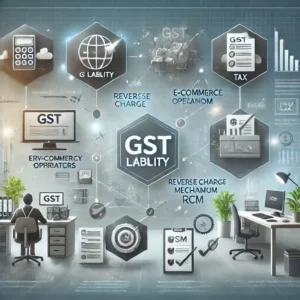GST Liability for E-Commerce Operators Under RCM – A Comprehensive Analysis
In the evolving landscape of taxation, e-commerce operators are at the forefront of compliance requirements under the Goods and Services Tax (GST) regime. One key aspect is the GST liability under the Reverse Charge Mechanism (RCM) on the supply of services. Let’s dive into the specifics of this provision and understand its implications.

What is Electronic Commerce?
Section 2(44) of the CGST Act defines “Electronic Commerce” as:
The supply of goods or services or both, including digital products over a digital or electronic network.
Examples: Amazon, Flipkart, Zomato, Urban Clap, Zepto.
This definition encompasses all transactions where goods or services are ordered via apps or websites and are fulfilled by connecting suppliers to customers through a platform.
Who is an Electronic Commerce Operator?
Section 2(45) defines an Electronic Commerce Operator (ECO) as:
Any person who owns, operates, or manages a digital or electronic platform for electronic commerce.
These operators act as intermediaries and are responsible for facilitating the supply of goods or services.
Section 9(5) of the CGST Act: Reverse Charge Mechanism Explained
Under Section 9(5) of the CGST Act, the government may, through a notification, specify services where the tax liability for intra-state supplies is shifted to the e-commerce operator.
Key Highlights:
Scope of Application:
This provision specifically applies to the intra-state supply of services through e-commerce operators.Notifications for Services:
Notifications are issued to identify services that will attract GST liability under RCM.Compliance in Case of Default:
In the event of non-compliance or default, all recovery provisions under GST law are applied to the e-commerce operator.
Notification 17/2017 – Central Tax (Rate)
Effective from July 1, 2017, this notification outlines the services subject to RCM when supplied via e-commerce platforms. Over time, amendments and additional circulars, such as Circular 167, have expanded the scope of services covered under this provision.
Practical Implications for E-Commerce Operators
Liability for Tax Payment:
The e-commerce operator is deemed the supplier for specific services and must discharge GST liability.Compliance and Reporting:
ECOs need to ensure accurate reporting and timely payment of GST to avoid penalties or recovery actions.Risk of Defaults:
Any non-payment or delay can invoke recovery mechanisms, making compliance a critical priority.
Conclusion
E-commerce operators play a pivotal role in the GST ecosystem, and the provisions under Section 9(5) reinforce their responsibility in tax collection and payment. Businesses operating in this sector must stay updated with notifications and amendments to remain compliant.
By adhering to the RCM guidelines and leveraging robust tax systems, e-commerce operators can not only avoid penalties but also contribute to a more streamlined tax administration process.
